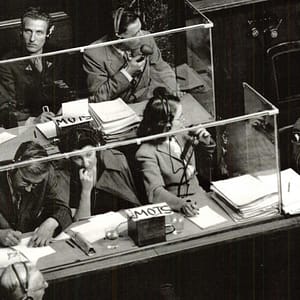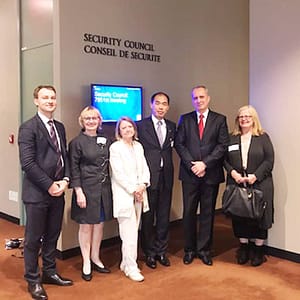The United Nations Pays Tribute to the Work of Translators and Interpreters
Easels displaying photographs line the curved hallway at the United Nations. An Iraqi interpreter dressed in fatigues pulls on a face mask. In Afghanistan, a journalist and his interpreter engage in deep conversation inside a cramped market stall. Linguists wearing headsets focus on the demanding task of listening and rendering a message into a microphone simultaneously. Poignant images depicting translators and interpreters facilitating communication around the world.
To celebrate the opening of this compelling exhibition, the Permanent Representation of Belarus to the UN had arranged for a lineup of speakers that included the Deputy Minister of Foreign Affairs of the Republic of Belarus, the United Nation’s Under-Secretary-General for General Assembly and Conference Management, and the current and former presidents of the International Federation of Translators. The last to take the podium was our very own Founder & CEO Vigdis Eriksen, addressing the crowd in her capacity as chair of the board of Red T, a non-profit organization dedicated to the protection of translators and interpreters in high-risk settings.
Vigdis spoke powerful words to acknowledge some hard truths. “The profession of translator or interpreter can lead to the loss of life, limb, or liberty. Such is the case during or post armed conflict, in detention camps and prisons, and in countries where the translation of sensitive literature brings incarceration or death.” Representing a coalition consisting of Red T and five major international language associations, Vigdis called on the UN “to adopt an international instrument for the protection of civilian translators and interpreters similar to the Resolutions that protect journalists.”
The Coalition
In light of the escalating persecution, prosecution, imprisonment, and slaughter of translators and interpreters across the world, Red T has taken up the cause. It advocates on behalf of these embattled linguists, giving them a voice. Red T educates and rallies the public, works to dispel the perception of translators as traitors and helps advance the world’s understanding of the translation and interpreting professions. In partnership with the International Association of Conference Interpreters (AIIC) and the International Federation of Translators (FIT), Red T formed a coalition to generate increased awareness and impact. The coalition has expanded to include the International Association of Professional Translators and Interpreters (IAPTI), Critical Link International (CLI), and the World Association of Sign Language Interpreters (WASLI). Coalition members promote the cause via social media platforms and Open Letters to governments.
But it’s not enough. The coalition needs the UN’s support.
Let’s Chat!
Get in touch to speak with a member of our team.
The United Nations
The ability to communicate effectively across languages is essential to the UN’s mandate which includes maintaining international peace and security, protecting human rights, delivering humanitarian aid, promoting sustainable development, and upholding international law. The work of translators and interpreters helps ensure that the UN’s goals and actions are understood by the broadest possible audience so they have maximum reach and effectiveness.
The United Nations works with hundreds of language professionals to translate and interpret into the six official languages of the UN (Arabic, Chinese, English, French, Russian and Spanish), as well as other languages as needed. In addition to translators and interpreters, they employ a variety of specialists, including proofreaders and editors, verbatim reporters, terminologists, reference assistants, copy preparers, and production editors to handle a wide range of content on topics such as human rights, peace and security, and development.
International Translation Day
The UN has taken an important step this year which pays tribute to the crucial work of language professionals. On May 24, 2017, the General Assembly adopted Resolution A/RES/71/288, acknowledging the role of professional translation in connecting nations, and fostering peace, understanding, and development. In the same resolution, the UN General Assembly declared September 30th as UN International Translation Day.
International Translation Day is not new. It was established by the International Federation of Translators in 1953, and has been celebrated every year on September 30th on the feast of St. Jerome, the biblical scholar and patron saint of translators. But this year is an especially exciting milestone, as International Translation Day has been further elevated by receiving this new recognition from the international community.
The UN celebrated its first International Translation Day with a documentary photography exhibit entitled “Day-to-Dayness of Language Professionals: Bringing Nations Together.” The opening ceremony was hosted by the Permanent Missions of Azerbaijan, Belarus, and Turkmenistan (in cooperation with the UN’s Department for General Assembly and Conference Management), all three of whom supported the passing of the Resolution.
Featured Services
Learn more about…
Why We Support This and You Should, Too
The world cannot function without translators and interpreters: They help the public stay informed by interpreting for the press; they assist organizations such as the UN that provide humanitarian assistance; they act as language bridges for militaries in conflict zones; they ensure due process and justice in courts and tribunals; they keep peace negotiations going across the world; and they contribute to cultural diversity and the development of inclusive societies.
At Eriksen, we stand behind the coalition in its mission to establish translators and interpreters as a global protected community. We thank the UN for acknowledging the contributions of linguists with the recognition of International Translation Day. We applaud Belarus Deputy Minister of Foreign Affairs H.E. Andrei Dapkiunas for his speech on May 25th in which he called on the Security Council to take up the coalition’s initiative. In light of this support from the international community, we are optimistic that we will soon see the adoption of a formal resolution or other protective text that will safeguard all members of the profession.
We encourage you to sign the petition urging the UN to adopt a Resolution to protect civilian linguists. Follow Red T on Twitter (@TheRedT) and read more about their advocacy on the Red T website.
 Named to the 2024 Inc. 5000 list of fastest-growing companies and ranked among the world’s top 100 language service providers by CSA Research
Named to the 2024 Inc. 5000 list of fastest-growing companies and ranked among the world’s top 100 language service providers by CSA Research

